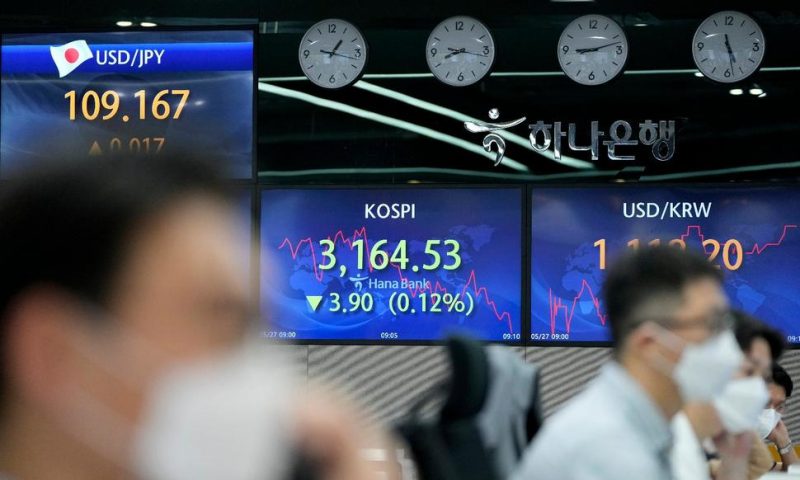Asian shares are mostly lower as investors await U.S. economic data expected later in the global day.
TOKYO — Asian shares fell Thursday, as investors watched for signs of inflation and awaited U.S. economic data expected later in the day.
Japan’s benchmark Nikkei 225 shed 0.8% in early trading to 28,409.41. South Korea’s Kospi dipped 0.7% to 3,146.54. Australia’s S&P/ASX 200 inched down less than 0.1% to 7,089.90. Hong Kong’s Hang Seng slipped 0.5% to 29,019.84. The Shanghai Composite index edged 0.1% to 3,597.85.
The Japanese government is expected to extend its “state of emergency” in some areas including Tokyo past May 31, in an effort to curb COVID-19 cases. Public concern has grown with the Olympics due to begin in Tokyo on July 23. Surveys show a majority of residents want the games canceled or postponed.
“There are push-backs all round right now, and they are going to buffet markets, largely because they aren’t all pushing in the same direction,” RaboResearch said in a report.
Technology shares were under pressure, though Chinese mobile phone maker Xiaomi rose 4% after it confirmed that the U.S. had removed it from a blacklist for Chinese tech companies.
On Wall Street, the S&P 500 ended just under 0.2% higher after wavering between small gains and losses. Retailers and other companies that rely on consumer spending made solid gains. Communication and financial stocks also helped lift the market. The gains were tempered by declines in health care, technology and other stocks.
The S&P 500 rose 7.86 points to 4,195.99. The Dow Jones Industrial Average, which turned 125 years old Wednesday, gained less than 0.1% to 34,323.05. The Nasdaq added 0.6% to 13,738. The Russell 2000 index of smaller companies gained 2% to 2,249.27.
The S&P 500 hit an all-time high on May 7th, but then fell for two straight weeks heading into this week. The index is on track for a gain this week of about 1%.
The next key economic update is set for Thursday, when the Commerce Department releases its latest GDP report for the first quarter. Economists are expecting a huge rebound in 2021 and results from the beginning of the year will give Wall Street a clearer picture moving forward.
The growing economy has also raised inflation concerns, though analysts expect that much of the increase will be tied to economic growth and will be digestible. Concern centers around stronger inflation prompting governments and central banks to roll back economic stimulus and change course on interest rates. Federal Reserve officials have said that they see no need yet to change course.
Markets have been bumpy over the last few days as investors move past a stellar corporate earnings season and await additional clues on economic growth and inflation, which has been rising.
“That’s just going to be the state of the market environment for some time to come,” said Kristina Hooper, chief global market strategist at Invesco.
Investors bid up shares in several retailers that delivered strong quarterly report cards. Dick’s Sporting Goods jumped 16.9% after reporting a surge in first-quarter sales and solid earnings as team sports returned. Urban Outfitters rose 10% and Abercrombie & Fitch climbed 7.8% on similarly strong financial results.
In the U.S., where the vaccine rollout has progressed at a better pace than in Asia, retailers, hotels and cruise lines are poised for growth as more people get back to some semblance of normal.
In energy trading, benchmark U.S. crude slipped 23 cents to $65.98 a barrel in electronic trading on the New York Mercantile Exchange. It gained 14 cents to $66.21 per barrel. Brent crude, the international standard, lost 21 cents to $68.66 a barrel.
In currency trading, the U.S. dollar edged up to 109.15 Japanese yen from 109.14 yen. The euro cost $1.2189, down from $1.2192.

